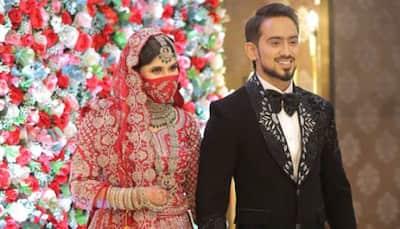
In a dramatic turn of events from the world of entertainment, Adnaan Shaikh, a popular contestant from Bigg Boss OTT 3, has become the center of a heated controversy that has taken social media by storm. The controversy erupted after Shaikh’s sister, Iffat, unveiled the identity and religion of his wife, sparking widespread debate and backlash from netizens across platforms.
Adnaan Shaikh recently entered marital bliss, choosing to keep details about his significant other under wraps, a decision that was respected and praised by many of his fans for its adherence to religious sentiments. His decision was met with curiosity and intrigue, as both he and his wife opted to keep her identity hidden, masking her face in public appearances and social media posts. This enigmatic approach drew attention, with fans commending the couple for honoring the privacy and sanctity of their union in the digital age.
However, this veil of privacy was shattered when Shaikh’s sister, Iffat, took to social media to disclose the identity of Adnaan’s wife, revealing her to be Riddhi Jadhav, a Hindu by religion. The revelation has since gone viral, fueled by the cross-religious dimension of their relationship. Adding fuel to the fire, it was alleged by Iffat that Riddhi faced ostracization from her family due to her relationship with Adnaan, leading to a year-long live-in relationship before marriage.
Adnaan’s reaction to the disclosure was swift and dramatic, as he reportedly confronted his sister in a manner that turned violent. Following the altercation, Iffat filed a police report against Adnaan, escalating the family dispute into a legal issue. The incident underscores the tensions and complexities that can arise from intertwining familial bonds, religious beliefs, and public scrutiny.
In an age where personal lives are often laid bare on digital platforms, Adnaan’s personal situation has triggered an avalanche of responses from the public, many of which draw on societal and religious tensions.
. With accusations of “love jihad” surfacing— a term controversially used to describe a conspiracy theory alleging that Muslim men marry women of other faiths to convert them to Islam— the couple’s marriage has ignited a larger debate about interfaith marriages and religious conversion.
It is further reported that, according to Iffat, Riddhi converted to Islam prior to their marriage, a detail that has intensified public discourse, overshadowing what would otherwise be seen as a private matrimonial issue. Social media has become a battleground with mixed reactions, ranging from accusations against Adnaan for promoting a particular religious agenda, to defenders rallying behind the notion of love transcending religious boundaries.
Adnaan Shaikh, who became a household name after his stint on Bigg Boss OTT 3, is no stranger to the limelight. Yet, this recent controversy might be the most challenging he has faced, as personal decisions intertwine with public perception. As he navigates through this complex web of family dynamics and societal expectations, the situation exemplifies the pressures of maintaining personal privacy in the face of relentless public curiosity.
The incident raises critical questions about the boundaries of personal freedom in an era dominated by social media, where individual narratives are constructed and dismantled in an instant. Adnaan’s case highlights the fine line entertainers walk between public interest and personal privacy, especially when familial disputes surface in the public domain.
While the legal aspects of Iffat’s complaint are yet to unfold fully, what remains undeniably clear is the profound impact of such public disputes on the lives of those involved. The story continues to develop as netizens dissect every piece of available information, ensuring that this family drama remains in the public eye for the foreseeable future.
As the narrative around Adnaan Shaikh’s marriage continues to evolve, one thing remains certain: the intersection of personal relationships, religious identity, and public life will keep this story at the forefront of public discourse, possibly prompting deeper reflection on the societal implications of such personal matters.












